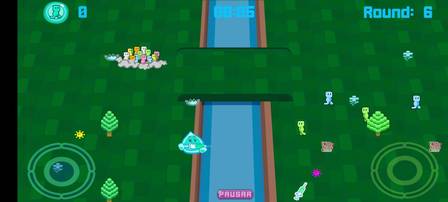If in real life it is not easy to understand that reducing social isolation increases the risk of the spread of Covid-19 – in a context in which the majority of the population is not vaccinated – in the game of Vacc, idealized by Brazilians. Scientists, it is easy to note that the more people appear on the screen, the more difficult it will be to contain the spread of the virus due to infection and to vaccinate the largest possible number of individuals.
The mission in the project is assigned to Maria Gotinha, and it is controlled by computer via the left mouse button to apply pollen doses and the letter w, a, sed or arrow keys to control the character’s direction. On a cell phone, it is moved by the commands directly left and right in the game image, as if it were video game controllers.
“I always thought fun teaching could be through games. Since there is really good information on the Internet, the problem is getting people to access and care about it,” said USP game creator Helder Nakaya, a professor at the School of Pharmaceutical Sciences at Southern University Pacific is the Laboratory Coordinator for Bioinformatics and Computer Systems Biology.
As described in the game, the user has to assume “control over vaccination, which increases in difficulty as social isolation is broken.”
“The challenge is to reach people before they get close to items like fake news and conglomeration, which makes them vulnerable targets for the viruses that are in the game,” he explains.
Its goal is to make the player aware of the immunization process, the harm caused by misinformation circulating on the Internet and not using masks, the effects of herd immunity and how the variables work. To win, you need to vaccinate as many people as possible and eliminate the virus.
To explain the concept of herd immunity, for example, the game protects characters who are close to several immunized persons.
“The game and everything else is asking the population to take the side of the vaccine; the importance of masking and social isolation (even with vaccines); herd immunity; the viral variants that appear in epidemics and how they can escape protecting the vaccine and even the danger of believing in false news. All this the player will learn without realizing That, “Nakaya said.
Thus the difficulty increases with each stage, as social isolation decreases, characters spread in the streets, and the virus spreads faster. However, while there is false news and clusters holding back, bonus items are also found along the way, favored by science, such as lab flasks and syringes containing vaccine supplies. These symbols, in turn, make Maria Gotenha stronger.
The vaccine was developed at the University of the South Pacific College of Pharmaceutical Sciences (FCF) Neste link To be played on desktop and also in Play Store on Android mobile devices. Members of the “All for Vaccines” campaign participated in the development of the game. The establishment has also received support from the CNPq’s National Institute of Vaccine Science and Technology, the University of the South Pacific Vaccine Research Support Center and Paraná Federal University.
Other professionals who worked on the project are Professor Rodrigo Arantes Rees, Coordinator of the Mobile Laboratory for Scientific Education at UFPR Litoral, UFPR Biomedical Informatics student Claudio Torres Jr., in charge of programming, designer Alain de Carvalho, who designed the elements, and Professor Murillo Giraldo, author Songs.
As part of the Levacc research project, from the Ministry of Health, the game asks users to donate pictures of their vaccination cards, so that they can be computerized and integrated into a database.
“This will be important for the government to know which population and areas are protected from diseases that can be prevented by means of the vaccine,” Nkaya said.

“Hardcore beer fanatic. Falls down a lot. Professional coffee fan. Music ninja.”







More Stories
The law allows children and adolescents to visit parents in the hospital.
Scientists pave the way for the emergence of a new element in the periodic table | World and Science
Can dengue cause hair loss? Expert explains how the disease affects hair